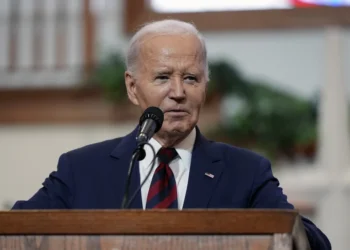WHAT’S HAPPENING TODAY: Good afternoon and happy Friday, readers! In today’s Daily on Energy, we take a look at President Donald Trump’s four executive orders meant to streamline the construction of nuclear reactors over the next four years.
Callie and Maydeen also take a look at the number of oil rigs active in the U.S. and what it means for the Trump administration’s ‘drill, baby drill’ agenda. Read on to see how 11 states are reacting to the Senate’s vote to overturn California’s vehicle emission waiver.
We hope you all have a restful long Memorial Day weekend. Daily on Energy will be back in your inboxes on Tuesday!
Welcome to Daily on Energy, written by Washington Examiner energy and environment writers Callie Patteson (@CalliePatteson) and Maydeen Merino (@MaydeenMerino). Email cpatteson@washingtonexaminer dot com or mmerino@washingtonexaminer dot com for tips, suggestions, calendar items, and anything else. If a friend sent this to you and you’d like to sign up, click here. If signing up doesn’t work, shoot us an email, and we’ll add you to our list.
QUOTE OF THE WEEK: Clean energy advocates have been left reeling after House Republicans accelerated cuts to green tax credits in their tax cut and spending reconciliation bill that passed the House yesterday.
“Nobody that assesses what the House bill does can credibly refer to the bill as taking a scalpel to the clean energy tax incentives, what the House did was take a sledgehammer and place onerous restrictions upon that sledgehammer, and so it just does not work,” American Clean Power’s Chief Advocacy Officer Frank Macchiarola told Callie.
TRUMP GIVES A BOOST TO NUCLEAR: President Donald Trump signed four executive orders Friday afternoon aimed at jumpstarting the construction of nuclear reactors over the next four years.
The details: The executive orders would overhaul and simplify the regulatory processes for approving new nuclear energy projects, while also boosting domestic mining and enrichment of uranium, to reduce reliance on foreign nations like China and Russia. The four orders specifically call for the following:
- Reforming nuclear research and development at the Department of Energy
- Reforming DOE and Department of Defense regulations to pave the way for building nuclear reactors on federally owned land
- Overhauling the Nuclear Regulatory Commission, targeting its licensing timeline and agency culture
- Boosting domestic mining, enrichment and conversion capabilities for uranium.
Through these executive orders, senior White House officials said, the administration’s goal is to be able to test and deploy new nuclear reactors before Trump leaves office.
“President Trump here today has committed to energy dominance, and part of that energy dominance is that we’ve got enough electricity to win the AI arms race with China,” Interior Secretary Doug Burgum said during the executive order signing.
“What we do in the next five years related to electricity is going to determine the next 50 because it’s the first time in history where electricity can be translated into intelligence, and we need that intelligence for every aspect of our economy,” Burgum said.
Read more from Callie here.
‘DRILL, BABY, DRILL’ UPDATE – RIG COUNT DOWN BY DOZENS ON THE YEAR: The total number of drilling rigs active in the U.S. fell by 10 this week to 566, according to data from Baker Hughes released today. Most of the weekly change was seen at onshore rigs that drill for oil and gas. From this time last year, the number of active rigs fell by 34.
The dropping rig count spells trouble for the Trump administration’s plans to “drill, baby, drill,” and is seemingly a direct response to volatile oil prices. Earlier this month, major shale producers like Diamondback Energy and Liberty Energy said they may be forced to slow down production as prices remain near the $60 line.
As of around 1:30 p.m. today, West Texas Intermediate was priced at $61.58 per barrel while International benchmark Brent Crude was selling at $64.82 per barrel.
ELEVEN STATES LAUNCH CLEAN CAR COALITION: Eleven states announced the launch of the Affordable Clean Cars Coalition, aimed at advancing a further transition toward electric vehicles, following the Senate vote to overturn California’s vehicle emissions waiver.
“We will continue collaborating as states and leveraging our longstanding authority under the Clean Air Act, including through state programs that keep communities safe from pollution, create good-paying jobs, increase consumer choice, and help Americans access cleaner and more affordable cars,” the states said.
The states include: California, Colorado, Delaware, Massachusetts, Maryland, New Jersey, New Mexico, New York, Oregon, Rhode Island, and Washington.
DOE DESIGNATES COAL USED IN STEELMAKING AS A CRITICAL MATERIAL: The Energy Department announced it would designate the coal used in steel production as a critical material.
Coal used in the production of steelmaking is known as metallurgical coal. It is used to produce coke, fuel, and reactants required for steel production. A critical material is a non-fuel mineral, element, or substance that the Energy Department considers a risk for supply chain disruptions and a key component for energy technologies.
The department said the designation is aimed at supporting the steel industry while also boosting coal production. It added that the move is aligned with Trump’s executive order to “reinvigorate” the coal sector.
“Metallurgical coal is more than a fuel—it is a cornerstone of our industrial base,” said Energy Secretary Chris Wright. “By designating metallurgical coal as a critical material, we are ensuring that American steel, generated by American coal, remains the backbone of our manufacturing sector.”
GERMANY BACKS NORD STREAM PIPELINE BAN: German Chancellor Friedrich Merz is reportedly supporting a proposed ban on Nord Stream pipelines connecting the European country to Russia, despite reported interest from the U.S. to restart the pipelines.
The details: Three officials familiar with the matter told the Financial Times this week that Merz has actively been working against efforts to revive debate around the benefits of restarting the pipelines, which run under the Baltic Sea from Russia to Germany.
The European Union is reportedly considering including the pipelines in its upcoming round of sanctions against Moscow over its war in Ukraine. The officials told the Financial Times that if the pipeline bill is added to the sanctions package, it “potentially removes a political problem” for Merz.
The growing opposition to the pipeline among German officials comes two months after reports indicated the U.S. has shown interest in restarting the flow of Russian gas to Europe in order to strengthen economic ties between the U.S. and Russia.
Some background: Nord Stream 1 was operational between 2011 and 2022, with gas flow having been halted by energy company Gazprom amid Western sanctions on Russia over their invasion of Ukraine. Nord Stream 2 was completed in 2021, but it has not been used. Both pipelines were damaged in attacks in September 2022 that no one has yet claimed responsibility for.
ONLY FOUR COUNTRIES DEEMED TO BE ‘HIGH RISK’ UNDER EUROPEAN UNION DEFORESTATION BAN: The European Union will only be considering four countries as high risk under its strict deforestation law, set to go into effect later this year.
The details: The European Commission said this week that products and goods imported from Belarus, Myanmar, North Korea, and Russia have a “high risk” of contributing to deforestation, according to Reuters. This means that at least 9% of companies exporting from these nations will be subject to compliance checks from EU member states. The countries will also need to show when and where certain commodities were produced and provide evidence that their production did not contribute to deforestation in the last five years.
Countries that have been deemed standard risk (including Brazil and Indonesia) will only see 3% of companies impacted by compliance checks, while 1% will be affected in low-risk countries. The United States is among those labeled as low-risk and will not be subject to supplying deforestation risk assessments, Reuters reported.
A reminder: First approved in June of 2023, the EU’s deforestation law is meant to reduce the number of products consumed in Europe that contribute to deforestation, while also lowering carbon emissions and addressing deforestation on a global scale.
Under the law, products made from commodities like coffee, soy, palm oil, cocoa, cattle, wood, and even rubber must not have been imported from recently cleared forests and must not have contributed to forest degradation.
ICYMI – DOJ AND FTC SUPPORT REPUBLICAN ANTITRUST LAWSUIT AGAINST ASSET MANAGERS: The Department of Justice and Federal Trade Commission filed an amicus brief yesterday supporting Texas Attorney General Ken Paxton’s antitrust case against Black Rock, State Street, and Vanguard.
Texas, along with several other Republican-led states, in November sued the asset managers, claiming the companies violated antitrust laws as they acquired stockholdings in coal producers and used their influence to constrict coal output.
“The Agencies have interests here in ensuring the correct application of the antitrust laws, including in America’s energy markets,” the DOJ and FTC wrote in the amicus brief.
“Doing so protects Americans from anticompetitive behavior that reduces the production of domestic energy, raises energy prices for consumers and businesses, and undermines America’s energy dominance,” they stated. “It also preserves competition for capital investments, providing Americans with broader and more efficient investment options.”
The other states suing the asset managers are Alabama, Arkansas, Indiana, Iowa, Kansas, Missouri, Montana, Nebraska, West Virginia and Wyoming. The lawsuit is the most prominent antitrust case related to Environmental, Social, and Governance (ESG) efforts.
Read more by Washington Examiner’s Elaine Mallon and Robert Blankenship here.
RUNDOWN
Bloomberg Recreational Boats Are Going Electric. Here’s What It’s Like to Ride One
The Washington Post The surprising ways U.S. weather data powers everyday commerce
CNN Mediterranean monk seals: Back from the brink

















